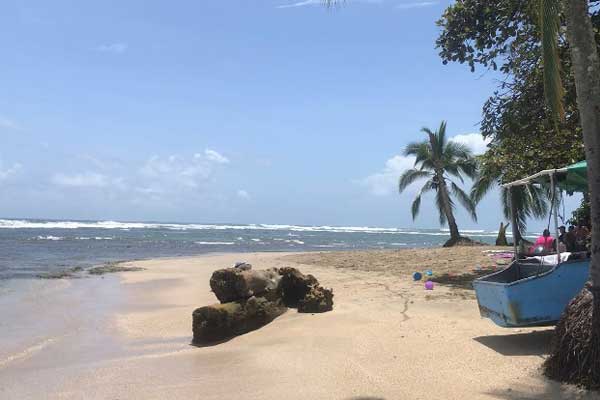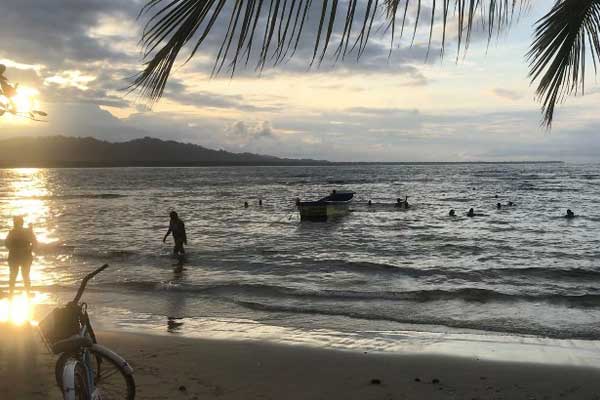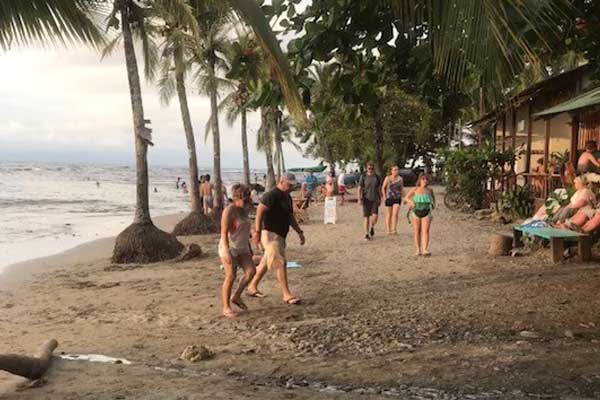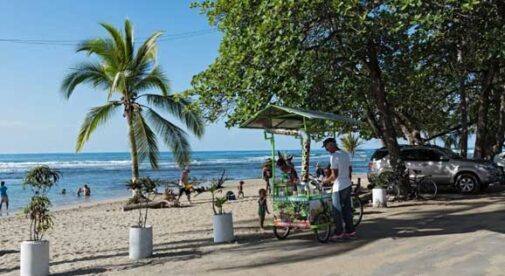Over a year ago, I left the U.S. on a one-way ticket to Costa Rica for $131. Having spent the prior 15 months locked away in a tiny room during the height of the pandemic, I had an invitation to come to Costa Rica and live for three months while overseeing rental properties for some friends in Playa Grande.
My first thought was that it would be a nice change of experience, perhaps a reset for my overtaxed nervous system, a season along the Guanacaste coast in beautiful Costa Rica. Living in such a manner with all of your worldly possessions in one bag requires a great amount of flexibility and willingness to move about with uncertainty. This, for me, is where the adventure and the freedom come with living such a way of life.
Are you interested in retiring abroad? Yes | Not Sure Yet
As of this writing, I have now been living in Central America for over a year as a nomad and expat. I’ve enjoyed leisurely seasons along the Guanacaste Coast in Playa Grande, with its laidback surf town vibe and epic sunsets, and alternatively, I have lived for months in the mountains within the Central Valley, surrounded by hectares of coffee during the rainy season.
Another requirement in flexibility for such a way of living is what can be referred to as “border runs” every 90 days. Most countries such as Costa Rica allow a tourist from the U.S. to visit and stay for up to 90 days. Panama, with its long history with the U.S., offers a more generous stay of 180 days. These border runs have become a regular part of my routine. Such is the case with most expats until they go through the process of obtaining some form of residency.
The small size of Costa Rica affords one the rich opportunity to experience so many elements with easy access as well as make these border excursions with relative ease. Currently living in Ciudad Colon in the Central Valley, just outside of San Jose, I decided it was time to experience first-hand the Caribbean coast and set my sail for a long-weekend trip to Puerto Viejo. For years, I have traveled to Playa Grande along the Pacific Coast and had yet to experience the Caribbean side of Costa Rica. I loaded up my playlist with Caribbean and Reggae music and hopped on a bus to Puerto Viejo.
From San Jose, Puerto Viejo is easily accessible in the southeastern part of the country for an escape from the modern city whether traveling by car or by bus. I took the trip by bus which was about a four-and-half-hour adventure, as all bus trips are. As a nomad and expat who is still living life on the move throughout Central America, the trip to Puerto Viejo was in conjunction with my required crossing of the border into Panama after 180 days in Costa Rica. For those expats still living as perpetual tourists, the border run experiences are always exciting adventures full of surprises in and of themselves.
While bus travel is not for everyone, I personally would not recommend any other way. Especially if you want to truly experience Costa Rica as a local and take in all of the lush natural scenery and roadside stops along the route. The price of a bus ticket is roughly $11.
From San Jose, we departed at 10.30 in the morning with warm empanadas and coffee in hand to arrive in Puerto Viejo around 3 p.m. Passing through Limon and making our way into Puerto Viejo de Talamanca, we immediately felt a shift into a much more laidback Caribbean rhythm of life even compared to the pura vida rhythm already found throughout Costa Rica. Limon is the center of the country’s Afro-Costa Rican community which fills the region with the food, music, and culture of locals whose heritage originated from Jamaica. This rhythm of life spills over into Puerto Viejo and the rest of the region.
First impressions of Puerto Viejo were that it was exactly the place I had always imagined Costa Rica would be. It has not been touched by the development of other areas and offers some of the most beautiful beaches in all of the country with some of the best snorkeling and fishing. And yet, it is the Caribbean influence and culture that makes Puerto Viejo a uniquely special place, you discover that you never want to leave immediately after you arrive. If I had discovered Puerto Viejo years ago on my very first exploratory trip to Costa Rica, perhaps I would have never left.

We quickly settled into our centrally located Airbnb with everything needed for a long weekend in this small, walkable town. Reggae music and a tropical breeze danced in the air as we unpacked our bags to the sounds of Bob Marley in the distance which immediately lowered any stress from half a day of travel.

Get Your Free Costa Rica Report Here:
Learn more about Costa Rica and other countries in our daily postcard e-letter. Simply enter your email address below and we'll send you a FREE REPORT – Costa Rica: The Land of Pura Vida
This special guide covers real estate, retirement and more in Costa Rica and is yours free when you sign up for our IL postcards below.
Our first stop upon recommendation was a coffee at Bread and Chocolate which was conveniently located immediately adjacent to us. It was originally opened and operated by a young couple from the U.S. who traveled by van and settled in Puerto Viejo. It has now evolved as one of the more popular spots in Puerto Viejo, with offerings made with cacao from BriBri, the indigenous region just south of the area.
Puerto Viejo is easily explored on foot from one end of town to the other and so we made our way to Playa Negra which is a black sand beach located at the end of the central road that runs through town. Old wooden fishing boats in bright colors of blue, green and yellow danced along the shore while children swam and laughed to the Calypso rhythms coming from the nearby restaurant and bar overlooking the cove. With locals riding by barefoot on bikes and hammocks swaying in the breeze, it was hard to imagine anyone in Puerto Viejo ever being stressed about anything. As sunset began to descend on Playa Negra we found our spot to sit as many of the locals gathered for the epic display of the day.

Following the spectacular sunset, we were eager to try some of the Caribbean food which is unique to the area. We found a cafe offering freshly made pati which is a spicy meat pie similar to an empanada, but uniquely Jamaican. For dinner we enjoyed the common dish of the region, red beans and rice made with coconut milk, which is to be found in many of the recipes of the area. As we made our way back to our lodging, the roads of Puerto Viejo were lined with artists and craftspeople offering their handmade works influenced by the area. The night was made complete with a fresh Torta Chilena and coffee on our way back.
Quite often the best meals are discovered in the most unlikely of places. The following morning for breakfast we stumbled upon such a gem. As we were strolling around the shops of Puerto Viejo we found ourselves lured into the Paradise Woloba Hostel on the main road, likely due to the singing and dancing of Katarina, the young woman working there while she swept the floor. She takes the bus there, almost an hour, every morning from BriBri, which is a mostly indigenous region in the southeasternmost part of Costa Rica, on the Panama border. Katarina could have been the poster image for why Costa Rica is among the happiest countries in the world. She prepared for us the most delicious breakfast and coffee I have had in Costa Rica, all with a smile and song and dance. We returned there each morning during our stay in Puerto Viejo.

Puerto Viejo is a place that is not conducive to a “things to do” article. It is quite the opposite. In Puerto Viejo we discovered a place that is still untouched by the lists and much of modern development. It is a place where one can still escape these modern distractions, and walk the dirt roads of the town to enjoy a laidback pristine beach while Bachata music plays in the background and locals are serving up pati and fresh coconut along the road.
The border run into Panama can be made within a day. We took this adventure by bus, roughly one hour each way, on Saturday. We were up with the sunrise at dawn and on the bus that ran down south to the Panama border at Sixaola. Arriving at the border, we noticed groups of other expats doing their routine border crossings. It is a relatively easy process that requires a walk over the bridge into Panama where you get your visa stamped before making your way back.
On Sunday afternoon, following a very tranquilo weekend along the Caribbean and a border crossing into Panama, just south of Puerto Viejo, we boarded our bus back to San Jose and enjoyed a sunset ride through the winding roads and scenery. In fact, we spent most of the ride planning our next return to Puerto Viejo.

Get Your Free Costa Rica Report Here:
Learn more about Costa Rica and other countries in our daily postcard e-letter. Simply enter your email address below and we'll send you a FREE REPORT – Costa Rica: The Land of Pura Vida
This special guide covers real estate, retirement and more in Costa Rica and is yours free when you sign up for our IL postcards below.
Related Articles
Guide Puerto Viejo: The Ultimate Tropical Paradise
There Are Many Reasons to Move to Costa Rica
In Photos: The Top 5 Beaches in Costa Rica
Upcoming Conferences
The Only 2024 Fast Track Panama Conference
If your dream retirement involves stunning beaches… lush green mountains… a warm climate with no hurricanes… first-rate healthcare… incredible value for money (a couple can live well on $2,200 a month)… and the World’s #1 Retiree Discount Program…
Join our Panama experts and expats in February and discover why Panama could be your perfect paradise.
REGISTER NOW, SEATS LIMITED: EARLY BIRD DISCOUNT HERE


.png)